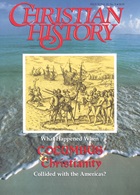Half a millennium ago, a longboat crunched onto the sand of a small island in the Bahamas. No one realized that first step ashore was, in one historian's words, "the most important event in human history since the end of the Ice Age." Two worlds had met—and could no longer stay separate.
With Columbus's voyages, people, animals, plants, diseases, and religious ideas passed between the continents. For example, Europe brought the horse to the Americas; the Americas gave the potato to Europe, a simple vegetable that later saved whole regions from starvation.
The history-shattering event has received a glut of media coverage—my bookshelf and file drawer are groaning under the added weight. But much of it has been simply ideological mudslinging.
Meanwhile, few have answered questions we at Christian History wondered about. Maybe you've asked them as well:
What were Columbus's religious motivations?
What kind of religious legacy did he and his followers leave?
How have those historical events affected what's happening religiously in Latin America today?
We were fascinated, troubled, rebuked, and inspired by what we found. Christian history has a way of doing that.
I'm pleased to announce the addition of an associate editor of Christian History. Mark Galli brings strong qualifications to his new position. A key one: according to our research, you've enjoyed reading his articles in Christian History (see "Persecution in the Early Church," "Dietrich Bonhoeffer," and "Christianity & the Civil War").
A native Californian, Mark earned his A.B. in history at the University of California—Santa Cruz. After theological training at Fuller Seminary in Pasadena, he served as a Presbyterian pastor for ten years and also did doctoral work in intellectual history at University of California—Davis. He then entered the world of journalism; for the past three years he has served as associate editor of Leadership, a respected journal for pastors. Mark is also a husband, father of three, and neophyte fisherman. At his church, he directs the adult education program and often teaches classes—sometimes on church history.
What does he hope to bring to Christian History? "When you're lost in the wilderness, you can wander if you want, or you can use your compass, take some azimuth readings, and gain your bearings. I hope the magazine will give Christians today a compass and a sense of bearing, so they better understand their place in God's plan."
Mark's already hard at work on our next issue. It features the "father" of modern missions, William Carey, and the dramatic missions movement he was part of.
Copyright © 1992 by the author or Christianity Today/Christian History magazine.
Click here for reprint information on Christian History.

Support Our Work
Subscribe to CT for less than $4.25/month




























